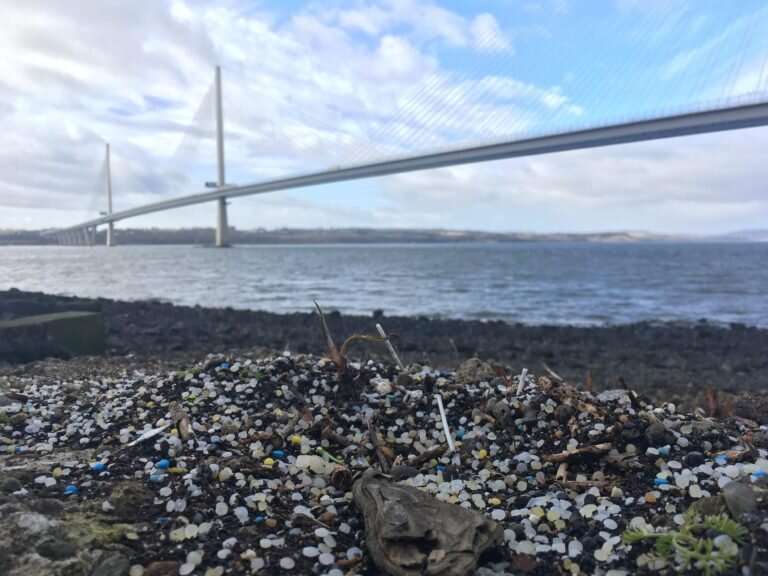Stepping up action on plastic pellets

Plastic is an incredibly useful material upon which much of our day-to-day life depends. The COVID-19 pandemic puts the importance of plastic in stark relief—protective personal equipment, intravenous tubes and soap dispensers all rely on plastic's properties.
However, as we work through this crisis, it is critical that efforts to eliminate plastic pollution are reinforced, not curbed—we may depend on plastic in certain settings, but we also depend on a healthy environment. From plastic bags clogging the stomachs of whales, to plastic bottles setting deadly traps for strawberry hermit crabs, it is evident that the way we produce, use and dispose of plastic is harming our oceans and marine life.
As such, Fauna & Flora International (FFI) is pleased to build upon our decade of microplastics experience by being part of a major step forward to address pellet pollution, one of the most chronic and invisible types of plastic pollution.
The significance of pellets
Pellets (colloquially "nurdles") are the building blocks of virtually all plastic products. These lentil-sized pieces of plastic are spilt at all stages of the plastic supply chain due to poor handling and management, including during recycling. They are easily eaten by a myriad of species, including seabirds such as puffins, albatross chicks and fulmars. This can have a series of detrimental implications for growth, feeding, reproducing, and ultimately these animals' survival.
An estimated 230,000 tonnes of pellets enter the ocean every year; the equivalent of over ten billion plastic bottles. High-profile events such as the 2018 Durban container ship spill, which resulted in 49 tonnes of pellets peppering South Africa's beaches, often steal the limelight. However, the more pervasive problem is the chronic, systemic trickle of pellets from millions of sites across the world.
A voluntary industry initiative to address pellet pollution, Operation Clean Sweep (OCS), has existed for almost 30 years. Although it has laid some useful groundwork, its success in preventing pellet pollution is limited. A raft of evidence highlights OCS' shortcomings, which centre largely on its absence of auditing, monitoring, and incentives to implement measures.
The supply chain approach
In order to truly address pellet pollution, an approach that encompasses the whole plastic supply chain is needed. While it may sound unwieldy, this simply means that all companies involved in the plastic supply chain must demonstrate that they are following best practice to prevent pellet spills and pollution, with accountability to ensure best practice is being followed.
Setting the standard
For some time FFI and partners have emphasised that preventing pellet pollution requires the development of an independently led technical standard. In late March, standards-setting body BSI launched the development of the first international pellet standard that will be applicable to all plastic products, co-sponsored by Marine Scotland (Scottish Government), British Plastics Federation and nine investor companies coordinated by the Investor Forum, represented by FFI in the standard development process. This multi-stakeholder process, which involves expert industry, policymaker and non-profit representatives, is a landmark step in developing best practice measures in pellet handling and management for all supply chain companies to implement to prevent pellet pollution.
Certification scheme
In order to enable auditing and demonstration of compliance with the standard along full supply chains, a certification scheme is being explored in parallel. FFI is part of a Scottish Government-led working group on pellets that is trialling how such a certification scheme could work in practice.
Drivers for uptake
Once a standard and certification scheme are in place, they will provide an excellent system by which to implement and verify best practice in pellet handling and management.
While leading companies with strong environmental convictions will likely implement this system, to date other initiatives such as OCS have lacked the necessary uptake to systematically tackle pellet pollution, as acknowledged by some within the plastics industry. Certification against a standard such as BSI's could drastically reduce pellet pollution, but only if adopted comprehensively across all parts of the supply chain. This is something that has not happened with OCS to date, despite its industry-driven nature, and that will not necessarily happen through market forces alone. As such, we believe legislation on pellet handling and management, based on certification against a standard, would eventually be an important driver to ensure the full uptake of good pellet management across the supply chain, helping to ensure an effective and fair system. The importance of such legislation in ensuring effectiveness and fairness has been seen with other initiatives, such as the UK Microbeads Ban, which helped to reinforce the voluntary leadership shown by some industry players.
Systematic change
The COVID-19 pandemic demonstrates the valuable role that plastic can play when responding to crises. The pandemic also lays bare the importance of protecting nature to prevent crises emerging in the first place. Governments and companies now have an opportunity to rebuild in a way that minimises plastic pollution, removes unnecessary uses and ensure that where plastic is necessary, it is made, used and disposed of responsibly.
Provided by Fauna & Flora International



















